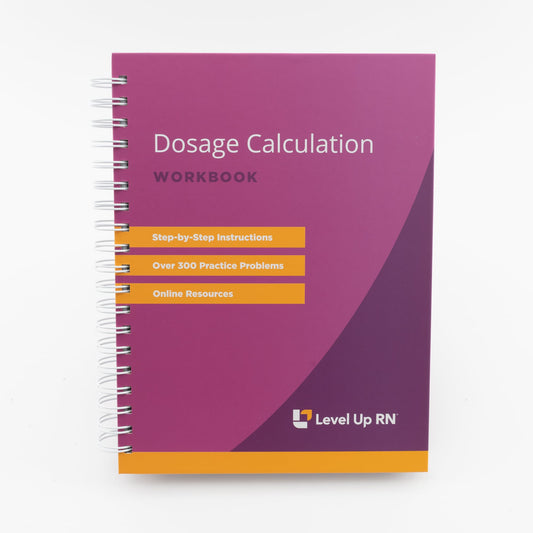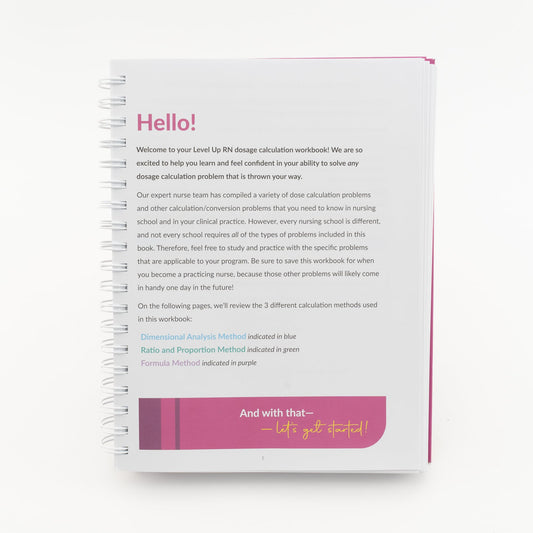Nursing Dosage Calculations, Part 2: Example Problems 4-5
Updated: Cathy ParkesIn this video, Cathy covers Dosage Calculation practice problems 4-5. You can download the practice questions and answer key and follow along as she explains how to work through the problems.
Full Transcript: Nursing Dosage Calculations, Part 2: Example Problems 4-5
Full Transcript: Nursing Dosage Calculations, Part 2: Example Problems 4-5
Cathy Parkes BSN, RN, CWCN, PHN:
Continuing on with our dosing calculations!
I'm on Problem #4, which deals with how to calculate dosing based on a patient's weight. In this particular problem, the patient weighs 150lbs and the order is for 0.3ml/kg of body weight. You can already see we're going to have to convert pounds to kilograms. Let's go ahead and do that first. 150lbs, and then 1kg has 2.2lbs. This is a conversion factor that you absolutely have to know, and you're going to be using it repeatedly when you're doing dosing calculations. This will give me kilograms. How much the patient weighs in kilograms. Then the order is for 0.3ml/kg. If we take 1kg, 0.3ml/kg, then our kilograms cross out and we're left with milliliters. Now, pay close attention to this question. They asked us, "how many milliliters should the patient get?" It also told us to round to the nearest 10th. It's really important to pay attention to a rounding instruction in the question. Sometimes it will tell you to round to the nearest whole number, sometimes it'll tell you to round to the nearest 10th. You've got to make sure you pay attention to that and do exactly that. Because you can do all your calculations correctly, then if you round wrong at the end, you're going to get the problem wrong. We definitely don't want to get the problem wrong. When we do this, we should get our milliliters. If I get out my handy dandy calculator here, and I take 150 divided by 2.2, multiply times 0.3, I get 20.45454545, like repeating on and on. Because I'm rounding to the nearest 10th, I would end up with 20.5ml. Not 20.45. Not just 20, we need to go to the 10th. It ends up being 20.5ml in this problem. We'll pick it up with the fifth problem next.
Now I'm going to go over Problem #5, which is another problem where we're calculating the dose based on the patient's weight, but it's a little more complicated and we're going to have to go through multiple steps to kind of work through the problem. In this particular problem, the doctor has ordered 12mg/kg/day, and it needs to be divided into doses every 8 hours. Our child weighs 22lbs, and what's available in terms of the medication is 200mg/5ml. The question is, how many milliliters do we administer per dose? Not for the whole day, but per dose. We know our child weighs 22lbs and our order is in kilograms. Right off the bat, we're going to have to convert to kilograms. We're going to take the child's weight, 22lbs, and we're going to multiply times 2.2lbs in 1kg. That will give us the child's weight in kilograms. then we know we're giving 12mg/kg/day. If we take that for each kilogram, we're going to be giving 12mg. If we do this math, we end up with-- Well, first of all, we cross off our kilograms and we should end up with milligrams per day. We ended up with 120mg for the day. But the question is per dose, versus for the day. We also need to know the milliliters. we're giving 120mg over a 24 hour period, but we really want to know how much we need to give every 8 hours cause that's what's ordered. We're going to cross off these hours and we're going to end up with 40mg per dose. Every 8 hours, we're going to give that child 40mg. But again, we're asking for milliliters. That's where we have to look at the medication we have available in what concentration. We take the 40mg, and we have 200mg in 5ml. I want the milligrams to cross off and I want to end up with milliliters. I'm going to put the 200mg on the bottom, put 5ml on top, cross off my milligrams, do that math. I ended up with 1ml per dose, which is every 8 hours. Again, I know it's a lot of different steps. We're really just trying to go with the units of measure we're given, and then work our way towards what's ordered to be able to answer the question. Just to review with this one again, we took the weight, we calculated the child's weight into kilograms, and then we found out how many milligrams they needed for the day. Then we multiplied this times 8 hours to find out how much we give per dose. Then we took that with the medication we have available to find out how many milliliters we need. That is Problem 5, probably the hardest one that I'm going through today. But we've got a few more that I'm going to go through. Hang in with me and we'll do some more. Thanks!



4 comments
Hi Cathy, I love your Level Up RN flashcards! Your flashcards and videos have raised my grades in nursing school while lowering my test-taking anxiety. I now understand and know the material to critically think through the questions and choose the best answer. Have you ever considered making a Level Up RN flashcard deck for dosage calculations or clinical math? Throughout my nursing program, we have to take dosage calculation quizzes before starting the class or clinical. As I progress through the program, the math gets harder, and I tend to forget the important or simple things when working on the problems. Practicing and reviewing with this kind of deck will be very helpful to other nursing students and me, especially when they are put into medical to know how to approach these types of clinical math questions and easy tips to remember the steps. I hope you will consider this request and continue to do what you do because it truly helps!
Do you have any word problems that point out just the volume as the answer or what’s the concentration. I had an exam and it was tricky the answer was in the problem and over looked it. I never ran into a calculation like that until my exam.
I have been pulling my hair out trying to learn this. THAAAANK YOUUU! I owe my education as a nurse to you!!!
Gm I think you’re a great teacher the tools are great but I would like a little bit more break to understand dosage and cal like having a chart on hand if you guys offer that it would be great thanks